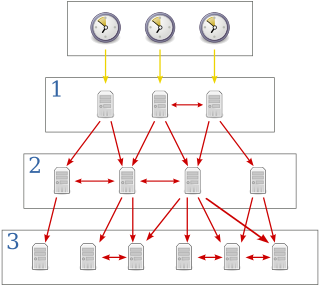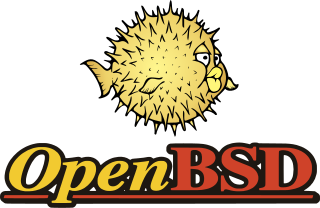Border Gateway Protocol (BGP) is a standardized exterior gateway protocol designed to exchange routing and reachability information among autonomous systems (AS) on the Internet. BGP is classified as a path-vector routing protocol, and it makes routing decisions based on paths, network policies, or rule-sets configured by a network administrator.
The Routing Information Protocol (RIP) is one of the oldest distance-vector routing protocols which employs the hop count as a routing metric. RIP prevents routing loops by implementing a limit on the number of hops allowed in a path from source to destination. The largest number of hops allowed for RIP is 15, which limits the size of networks that RIP can support.

The Network Time Protocol (NTP) is a networking protocol for clock synchronization between computer systems over packet-switched, variable-latency data networks. In operation since before 1985, NTP is one of the oldest Internet protocols in current use. NTP was designed by David L. Mills of the University of Delaware.
PF is a BSD licensed stateful packet filter, a central piece of software for firewalling. It is comparable to netfilter (iptables), ipfw, and ipfilter.

XORP is an open-source Internet Protocol routing software suite originally designed at the International Computer Science Institute in Berkeley, California. The name is derived from eXtensible Open Router Platform. It supports OSPF, BGP, RIP, PIM, IGMP, OLSR.
Zebra is a routing software package that provides TCP/IP based routing services with routing protocols support such as RIP, OSPF and BGP. Zebra also supports special BGP Route Reflector and Route Server behavior. In addition to traditional IPv4 routing protocols, Zebra also supports IPv6 routing protocols. With SNMP daemon which supports SMUX protocol, Zebra provides routing protocol management information bases.

OpenNTPD is a Unix daemon implementing the Network Time Protocol to synchronize the local clock of a computer system with remote NTP servers. It is also able to act as an NTP server to NTP-compatible clients.
The Network Time Protocol daemon (ntpd) is an operating system program that maintains the system time in synchronization with time servers using the Network Time Protocol (NTP).
The OpenBSD operating system focuses on security and the development of security features. According to author Michael W. Lucas, OpenBSD "is widely regarded as the most secure operating system available anywhere, under any licensing terms."
OpenOSPFD is an ISC licensed implementation of the Open Shortest Path First Protocol. It is a network routing software suite which allows ordinary general purpose computers to be used as routers exchanging routes with other computer systems speaking the OSPF protocol.
Quagga is a network routing software suite providing implementations of Open Shortest Path First (OSPF), Routing Information Protocol (RIP), Border Gateway Protocol (BGP) and IS-IS for Unix-like platforms, particularly Linux, Solaris, FreeBSD and NetBSD.

A routing protocol specifies how routers communicate with each other to distribute information that enables them to select routes between nodes on a computer network. Routers perform the traffic directing functions on the Internet; data packets are forwarded through the networks of the internet from router to router until they reach their destination computer. Routing algorithms determine the specific choice of route. Each router has a prior knowledge only of networks attached to it directly. A routing protocol shares this information first among immediate neighbors, and then throughout the network. This way, routers gain knowledge of the topology of the network. The ability of routing protocols to dynamically adjust to changing conditions such as disabled connections and components and route data around obstructions is what gives the Internet its fault tolerance and high availability.

OpenBSD is a security-focused, free and open-source, Unix-like operating system based on the Berkeley Software Distribution (BSD). Theo de Raadt created OpenBSD in 1995 by forking NetBSD 1.0. According to the website, the OpenBSD project emphasizes "portability, standardization, correctness, proactive security and integrated cryptography."
The Corosync Cluster Engine is an open source implementation of the Totem Single Ring Ordering and Membership protocol. It was originally derived from the OpenAIS project and licensed under the new BSD License. The mission of the Corosync effort is to develop, release, and support a community-defined, open source cluster.

OpenSSH is a suite of secure networking utilities based on the Secure Shell (SSH) protocol, which provides a secure channel over an unsecured network in a client–server architecture.
Resource Public Key Infrastructure (RPKI), also known as Resource Certification, is a specialized public key infrastructure (PKI) framework to support improved security for the Internet's BGP routing infrastructure.

OpenSMTPD is a Unix daemon implementing the Simple Mail Transfer Protocol to deliver messages on a local machine or to relay them to other SMTP servers. It was publicly released on 17 March 2013 with version number 5.3, after being in development since late 2008.
Free Range Routing or FRRouting or FRR is a network routing software suite running on Unix-like platforms, particularly Linux, Solaris, OpenBSD, FreeBSD and NetBSD. It was created as a fork from Quagga. FRRouting is distributed under the terms of the GNU General Public License v2 (GPL2).
SONiC is a free and open source network operating system based on Linux and developed by Microsoft and the Open Compute Project. SONiC includes the networking software components necessary for a fully functional L3 device and was designed to meet the requirements of a cloud data center. It allows cloud operators to share the same software stack across hardware from different switch vendors.






